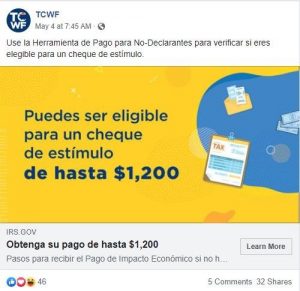
Shining a Light on COVID-19’s Uneven Impact
Despite the continued uncertainty surrounding the COVID-19 crisis, one thing is abundantly clear: low-income communities — particularly women, people of color, immigrants, and refugees — have been hit the hardest.
Through our Tax Credits for Workers and Their Families (TCWF) initiative, The Hatcher Group is working to build an understanding of COVID-19’s disproportionate impact and underscore the ways in which income-boosting policies can provide much-needed relief for the hardest-hit communities.
Since 2007, The Hatcher Group has led the TCWF initiative to raise awareness of and build support for tax credits for low-income Americans. Traditionally, this work has involved tracking news and legislation regarding the Earned Income Tax Credit, Child Tax Credit, and Child and Dependent Care Credit at the state and federal levels, providing individualized communications assistance to advocacy groups working on these tax credits, and hosting policy briefings on Capitol Hill.
When the COVID-19 crisis hit, we adapted our strategy. With state legislative sessions on hold and a growing need for immediate financial assistance among low-income communities, we knew we needed to broaden our focus to include more policies that help put money back into the pockets of working people. Tax credits are a vital resource, but in a crisis of such unprecedented magnitude, they’re not a silver bullet.
Through the TCWF blog and weekly news round-up emails, we now share the latest findings around COVID-19’s disproportionate impact on low-income communities, and compile news, legislation, and research on how tax credits and other income-boosting policies can help mitigate this impact.
We’re also working to raise awareness of the resources already available to low-income Americans. The federal Coronavirus Aid, Relief, and Economic Security (CARES) Act, passed in late March, included Economic Impact Payments worth up to $3,400 for a family of four. Those who had already filed their taxes or were preparing to file taxes would receive a payment calculated using the information they provided. But it wasn’t clear how those who don’t file their taxes — often those with the lowest incomes — would receive their payment, or if they were even eligible for a payment at all.

In response, The Hatcher Group created Facebook ads in both English and Spanish directing viewers to the IRS’s “Non-Filer Tool,” which allows anyone who hasn’t filed their taxes recently to check if they’re eligible for an Economic Impact Payment and fill out the information needed to receive one. Because most non-filers earn less than $12,200 per year, we targeted the lowest-income zip code in each state across the country.
With a limited budget for paid advertising, we’ve seen tremendous success. In less than 10 days, the ads in English garnered more than 400,000 views and generated 5,906 clicks, averaging $0.43 per click. The ads in Spanish garnered more than 80,000 views and generated 994 clicks, averaging $0.42 per click. The national average cost per click for Facebook ads is $1.72.
The success of this campaign illustrates two realities: there is a real and dire need for financial assistance during this time, and digital marketing may be more important than ever in helping low-income Americans access programs and resources available to them.
To learn more about COVID-19’s disproportionate impact and the financial resources available to low-income communities, sign up for TCWF’s weekly newsletter here.